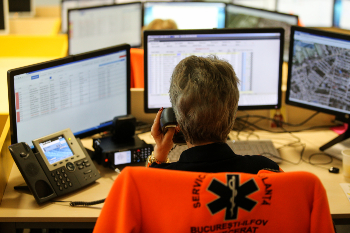 Police, fire, and ambulance dispatchers—sometimes referred to as public safety telecommunicators—are tasked with answering 9-1-1 emergency calls, determining the appropriate response based on agency procedures, relaying information to the proper first-responder agency, coordinating the dispatch of emergency response personnel to accident scenes, giving basic over-the-phone medical instructions, and more. Dispatchers are crucial to public safety as they’re the first person to gather clues and cues about an emergency and are tasked with understanding the next steps during moments of crisis.
Police, fire, and ambulance dispatchers—sometimes referred to as public safety telecommunicators—are tasked with answering 9-1-1 emergency calls, determining the appropriate response based on agency procedures, relaying information to the proper first-responder agency, coordinating the dispatch of emergency response personnel to accident scenes, giving basic over-the-phone medical instructions, and more. Dispatchers are crucial to public safety as they’re the first person to gather clues and cues about an emergency and are tasked with understanding the next steps during moments of crisis.
Because the role is so crucial to public safety, dispatchers are held to a higher standard than many other professionals. As a result, if you’ve been arrested or convicted, you may see a series of consequences, even if you face a misdemeanor that doesn’t lead to a sentence. Additionally, if you don’t report your conviction or plea to the Department of Health (DOH), you may face further penalties. Fortunately, you have the right to an administrative hearing during which you can present your case. The Umansky Law Firm’s team of experienced legal professionals may be able to help you avoid both the legal and administrative consequences.
The Florida Department of Health oversees all certifications for individuals who wish to become fire, police, and ambulance dispatchers in Florida. To earn a 9-1-1 Public Safety Telecommunications Certification, you need to successfully complete the necessary standardized examinations and training as outlined on the FDH website. This encompasses training programs that follow the state curriculum, a multiple-choice exam, and a fee of $125 ($75 to take the exam and $50 to submit the final application).
Suppose Florida police, fire, and ambulance dispatchers fail to report their conviction or plea deal to the Department of Health. In that case, they could potentially face penalties that include a letter of reprimand, fines, probation, suspension, or revocation. This notification must be within 30 days of the event.
Damages that could lead to disciplinary action include conviction of a crime related to their profession, the use of drugs while working, sexual misconduct, drug diversion, violation of standards of care, and defaulting on student loans.
If you’re a licensed fire, police, and ambulance dispatcher in Orlando who’s facing penalties for not reporting a conviction or plea to the Florida Department of Health, don’t wait to pursue the help of a skilled legal professional. During the administrative proceedings, a highly knowledgeable criminal and professional license defense lawyer from The Umansky Law Firm may be able to help you sidestep the associated consequences by putting together a concrete defense. By the end of a successful case, you may be able to maintain your reputation, keep your job, and return to the life you once enjoyed.
With more than 100 years of combined legal experience, the accomplished team at The Umansky Law Firm has what it takes to explore your case and battle for an outcome that’s in your best interest. We know the ins and outs of Florida administrative laws, especially as they relate to dispatchers, and we remain committed to protecting your rights and safeguarding you from any additional consequences or harm to your reputation. Give us a call or complete our contact form to schedule a free consultation.
The Umansky Law Firm Criminal Defense & Injury Attorneys
